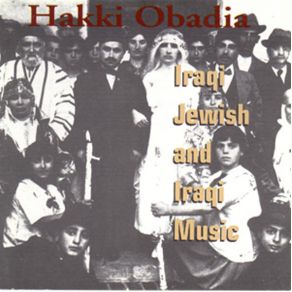Iraqi Jewish and Iraqi Music
Download links and information about Iraqi Jewish and Iraqi Music by HAKKI OBADIA. This album was released in 1995 and it belongs to World Music, Songwriter/Lyricist genres. It contains 21 tracks with total duration of 01:04:28 minutes.

|
|
|---|---|
| Artist: | HAKKI OBADIA |
| Release date: | 1995 |
| Genre: | World Music, Songwriter/Lyricist |
| Tracks: | 21 |
| Duration: | 01:04:28 |
| Buy it NOW at: | |
| Buy on iTunes $11.99 | |
Tracks
[Edit]| No. | Title | Length |
|---|---|---|
| 1. | Iftitah | 1:57 |
| 2. | Passover Songs: Man-Nish-Tanna / Dah-Yeh-Noo / Abadeem (Servants) (featuring Vocal) | 4:30 |
| 3. | Takseem Oud (featuring Oud) | 3:18 |
| 4. | Yam el Abaya (The Woman In the Black Robe and Veil) (featuring Vocal, Oud) | 3:17 |
| 5. | Mizwich (featuring Violin) | 4:07 |
| 6. | Yalle-Zeratt (featuring Vocal, Oud) | 2:45 |
| 7. | Samee' Iraq (featuring Violin) | 5:59 |
| 8. | Ibin Ammee Ya Salman (My Cousin Salman) (featuring Vocal, Oud) | 4:36 |
| 9. | Afahkee / Tabool Hinna (Wedding Songs) (featuring Tambourine, Vocal) | 1:56 |
| 10. | Iraqi Medley In 6/8 (featuring Violin) | 2:42 |
| 11. | Dance Zamra | 2:19 |
| 12. | Lamma Badah (featuring Vocal, Oud) | 3:21 |
| 13. | Afaki (featuring Vocal, Oud) | 3:00 |
| 14. | Yabul Hinna (featuring Vocal, Oud) | 1:30 |
| 15. | Shat el Arab (featuring 2 Violins) | 2:26 |
| 16. | Galbak SakherbJal-Loob (Your Heart Is Made of Stone) (featuring Vocal, Oud) | 2:44 |
| 17. | Seemaynee (Purim Songs) (featuring Vocal, Oud) | 1:34 |
| 18. | Violin Like Flute (featuring Anc Cello) | 2:06 |
| 19. | Ala Balade El-Mahboob (Take Me to My Beloved Country) (featuring Vocal, Oud) | 2:40 |
| 20. | Same' Saba (featuring Oud) | 6:05 |
| 21. | Dubkee (featuring Tambourine) | 1:36 |
Details
[Edit]OK, let's clear up the title first. This disc contains music of Iraq's Jewish population and of its "general," i.e. Muslim population. The artist, Hakki Obadia was a prominent Iraqi Jewish musician who emigrated to the U.S. in the late 40s. (Most Iraqi Jews emigrated to Israel after its founding.) He had a long career as a music teacher in the public schools of Long Island and as a performer of Arabic-American music. Mr. Obadia sings and plays all the instruments (oud, violin, tambourine, cello, recorder) sometimes overdubbing so that he can play two instruments on some tracks.
As a singer, Mr. Obadia's talents are modest but genial. He is more impressive as an instrumentalist. For example, on "Mizwich," he plays a violin that has its strings tuned in pairs of octaves, creating a ferocious, reedy timbre, almost like a small bagpipe or hurdygurdy. His performance on the oud is soulful and he has a nice note-bending technique. On one of the two versions of the wedding song "Yabul Hina," he startles the listener by actually strumming, instead of plucking, the oud.
The notes illuminate the music, which include Passover songs and Jewish wedding songs sung in a form of Hebrew distinctive to Iraq. These low-key versions might be a good addition to a modern celebration. One non-Jewish song that stands out for its fierce oudplucking and distinctive tune is "Lamma Badah," an Andalusian tune that is one of the most popular in the Arabic world.
This album is clearly one devoted man's labor of love. It lacks the polish and dramatic producing one might associate with a professional album. Regardless, it is a fascinating tour through little-known territory and contains several gems for those who keep their eyes open.